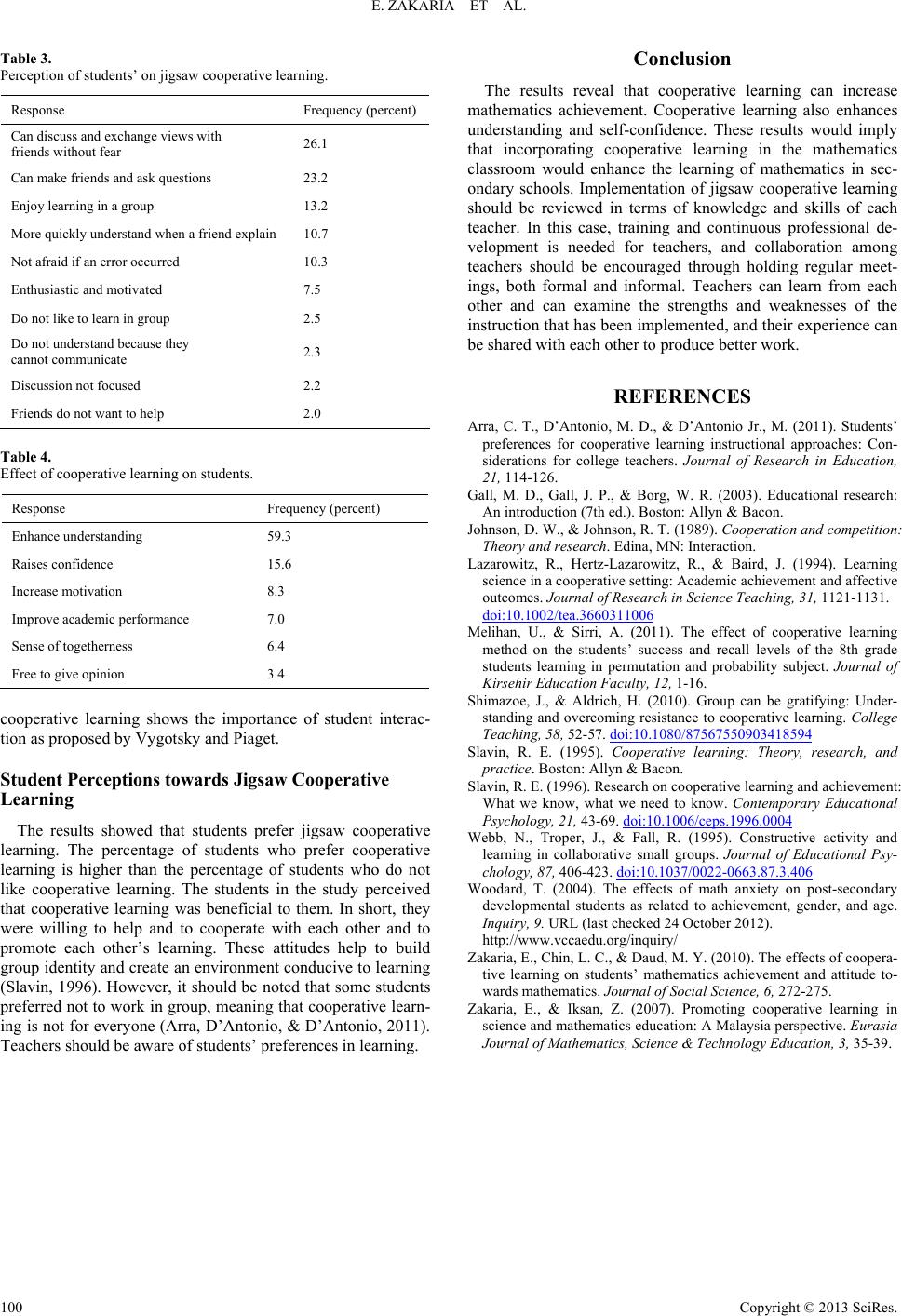
E. ZAKARIA ET AL.
Copyright © 2013 SciRes.
100
Table 3.
Perception of students’ on jigsaw cooperative learning.
Response Frequency (percent)
Can discuss and exchange views with
friends without fear 26.1
Can make friends and ask questions 23.2
Enjoy learning in a group 13.2
More quickly understand when a friend explain 10.7
Not afraid if an error occurred 10.3
Enthusiastic and motivated 7.5
Do not like to learn in group 2.5
Do not understand because they
cannot communicate 2.3
Discussion not focused 2.2
Friends do not want to help 2.0
Table 4.
Effect of cooperative learning on students.
Response Frequency (percent)
Enhance understanding 59.3
Raises confidence 15.6
Increase motivation 8.3
Improve academic performance 7.0
Sense of togetherness 6.4
Free to give opinion 3.4
cooperative learning shows the importance of student interac-
tion as proposed by Vygotsky and Piaget.
Student Perceptions towards Jigsaw Cooperative
Learning
The results showed that students prefer jigsaw cooperative
learning. The percentage of students who prefer cooperative
learning is higher than the percentage of students who do not
like cooperative learning. The students in the study perceived
that cooperative learning was beneficial to them. In short, they
were willing to help and to cooperate with each other and to
promote each other’s learning. These attitudes help to build
group identity and create an environment conducive to learning
(Slavin, 1996). However, it should be noted that some students
preferred not to work in group, meaning that cooperative learn-
ing is not for everyone (Arra, D’Antonio, & D’Antonio, 2011).
Teachers should be aware of students’ preferences in learning.
Conclusion
The results reveal that cooperative learning can increase
mathematics achievement. Cooperative learning also enhances
understanding and self-confidence. These results would imply
that incorporating cooperative learning in the mathematics
classroom would enhance the learning of mathematics in sec-
ondary schools. Implementation of jigsaw cooperative learning
should be reviewed in terms of knowledge and skills of each
teacher. In this case, training and continuous professional de-
velopment is needed for teachers, and collaboration among
teachers should be encouraged through holding regular meet-
ings, both formal and informal. Teachers can learn from each
other and can examine the strengths and weaknesses of the
instruction that has been implemented, and their experience can
be shared with each other to produce better work.
REFERENCES
Arra, C. T., D’Antonio, M. D., & D’Antonio Jr., M. (2011). Students’
preferences for cooperative learning instructional approaches: Con-
siderations for college teachers. Journal of Research in Education,
21, 114-126.
Gall, M. D., Gall, J. P., & Borg, W. R. (2003). Educational research:
An introduction (7th ed.). Boston: Allyn & Bacon.
Johnson, D. W., & Johnson, R. T. (1989). Cooperation and competition:
Theory and research. Edina, MN: Interaction.
Lazarowitz, R., Hertz-Lazarowitz, R., & Baird, J. (1994). Learning
science in a cooperative setting: Academic achievement and affective
outcomes. Journal of Research in Science T ea c hi ng , 31, 1121-1131.
doi:10.1002/tea.3660311006
Melihan, U., & Sirri, A. (2011). The effect of cooperative learning
method on the students’ success and recall levels of the 8th grade
students learning in permutation and probability subject. Journal of
Kirsehir Education Faculty, 12, 1-16.
Shimazoe, J., & Aldrich, H. (2010). Group can be gratifying: Under-
standing and overcoming resistance to cooperative learning. College
Teaching, 58, 52-57. doi:10.1080/87567550903418594
Slavin, R. E. (1995). Cooperative learning: Theory, research, and
practice. Boston: Allyn & Bacon.
Slavin, R. E. (1996). Research on cooperative learning and achievement:
What we know, what we need to know. Contemporary Educational
Psychology, 21, 43-69. doi:10.1006/ceps.1996.0004
Webb, N., Troper, J., & Fall, R. (1995). Constructive activity and
learning in collaborative small groups. Journal of Educational Psy-
chology, 87, 406-423. doi:10.1037/0022-0663.87.3.406
Woodard, T. (2004). The effects of math anxiety on post-secondary
developmental students as related to achievement, gender, and age.
Inquiry, 9. URL (last checked 24 October 2012).
http://www.vccaedu.org/inquiry/
Zakaria, E., Chin, L. C., & Daud, M. Y. (2010). The effects of coopera-
tive learning on students’ mathematics achievement and attitude to-
wards mathematics. Journal of Social Science, 6, 272-275.
Zakaria, E., & Iksan, Z. (2007). Promoting cooperative learning in
science and mathematics education: A Malaysia perspective. Eurasia
Journal of Mathematics, Science & Technology Educa tion, 3, 35-39.